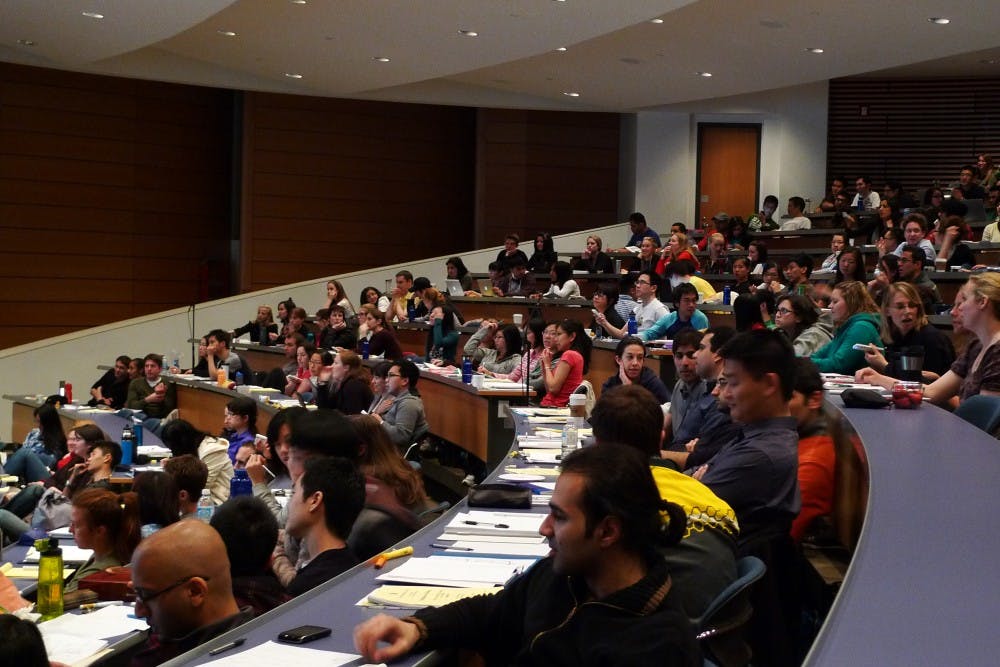
In light of the recent events at Mizzou and Yale, Penn's campus focuses on the line between free speech and cultural sensitivity. | Courtesy of Creative Commons
Penn's campus is no stranger to protests, and the demonstrations at Yale last week bring up the difficult balance between free speech and cultural sensitivity.
Last week more than 1,000 Yale students demanded the resignation of Associate Master of Silliman College Erika Christakis after she responded to an email from the school’s Intercultural Affairs Council and Dean Burgwell Howard, asking students to be thoughtful about the cultural implications of their Halloween costumes.
In her email, Christakis criticized the suggestions made by the council as potentially inhibiting freedom of speech and suggested that "If you don’t like a costume someone is wearing, look away, or tell them you are offended. Talk to each other. Free speech and the ability to tolerate offense are the hallmarks of a free and open society.”
In an open letter written by Yale student Ryan Wilson and signed by more than 740 students, Wilson discussed student discontent with the email and the tone it set.
“We are not asking to be coddled,” Wilson said in the letter. “The real coddling is telling the privileged majority on campus that they do not have to engage with the brutal pasts that are a part of the costumes they seek to wear.”
The perceived co-opting of cultures is a familiar topic to Penn students. In Spring 2014, a "gangsta" themed mixer between Chi Omega and Beta Theta Pi sparked outrage among some students who found the theme insensitive.
Wilson explained in the letter that for students of color, offensive costumes create an atmosphere in which they do not feel welcome on campus, whether intentional or otherwise.
“The purpose of blackface, yellow face and practices like these were meant to alienate, denigrate and to portray people of color as something inferior and unwelcome in society. To see that replicated on college campuses only reinforces the idea that this is a space in which we do not belong,” Wilson said.
At Penn, the disconnect between the right to free speech and the right of minority students to feel safe and respected on campus is also an issue.
"Freedom of expression is sometimes a slippery slope as well, especially when justifying hate speech or behavior," College sophomore Khalil Jones said. "There are certain ways to demonstrate, express or disagree that don't infringe upon other people's rights and freedoms to express themselves as well."
Last December, Phi Delta Theta came under fire for a holiday photo featuring a black blow-up sex doll among the mostly white members in the photo. Last semester, Students Organized for Unity and Liberation organized a protest outside of the Phi Delt house on Locust Walk to call attention to the perceived objectification of black bodies and what they believed to be a lack of adequate punishment or education following the incident.
In addition, 5B — the five-umbrella coalition for minority groups on campus — and the Penn Consortium for Undergraduate Women — now the Penn Association for Gender Equity — issued a statement to the photo after it was released in December, asking that immediate action be taken against the fraternity.
“The inclusion of a racially and sexually charged object in such a flagrant fashion displays a serious and immediate need for repercussions that reflect the severity of this misogynistic, racist offense,” the statement said.
Phi Delt was later placed on probation by its national organization in January and required to complete cultural sensitivity and sexual and relationship misconduct education programs, though many felt that this was not a severe enough punishment.
Penn is currently the only Ivy League school to have a “green light” rating from the Foundation for Individual Rights and Education, an award that goes to universities whose policies do not impede students’ right to free speech. Free speech is important for both sides of the argument but also leaves room for potentially insensitive comments or actions.
Protest groups also feel as if their right to free expression is sometimes ignored.
"Minority groups certainly aren't always respected on campus, especially concerning demonstrations or when we voice our opinions on issues," Jones said. "Oftentimes I feel like the general responses will be, 'It's not always about race,' or 'You're just making this about race.' When that sort of thinking is floating around in the air, students aren't really heard or respected."
The Daily Pennsylvanian is an independent, student-run newspaper. Please consider making a donation to support the coverage that shapes the University. Your generosity ensures a future of strong journalism at Penn.
DonatePlease note All comments are eligible for publication in The Daily Pennsylvanian.







